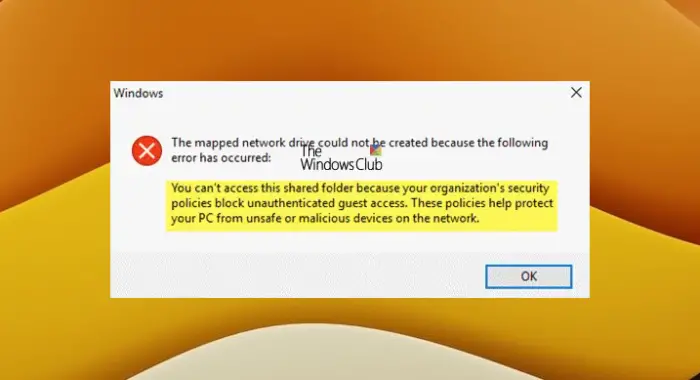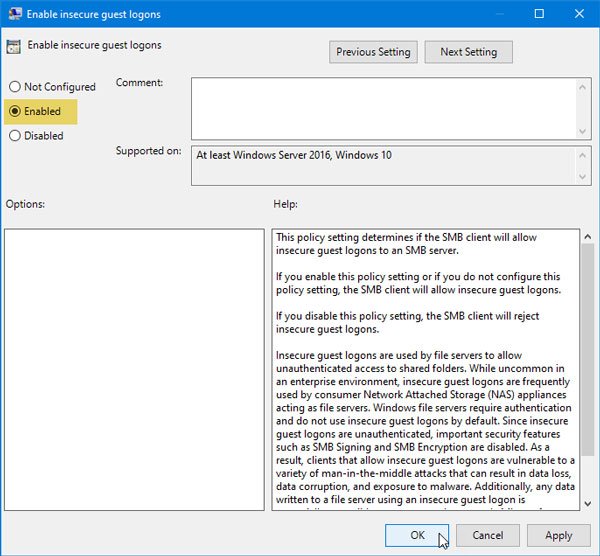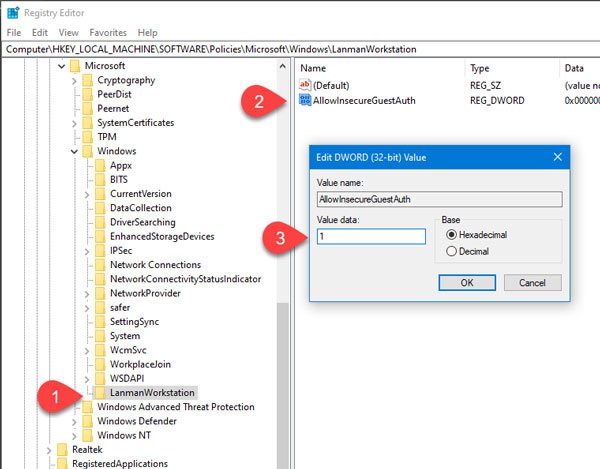If you try to connect to a device, which requires the credentials of a guest instead of proper authentication, you might come across an error message – You can’t access this shared folder because your organization’s security policies block unauthenticated guest access. To resolve this issue, you can use the Group Policy Editor or Registry Editor.

You can’t access this shared folder because your organization’s security policies block unauthenticated guest access. These policies help protect your PC from unsafe or malicious devices on the network.
The main reason why such an issue occurs is the lack of SMB1 installation and deactivation of SMB2 in Windows 10 v1709 or later versions. SMB or Server Message Block is responsible for guest access, and you may need to enable it manually so that it can allow insecure guest logons to an SMB server. So you need to go through some steps to enable SMB1 manually.
You can’t access this shared folder because your organization’s security policies block unauthenticated guest access
It happens because Guest Access in SMB2 is disabled by default. To fix this error in Windows 11 and Windows 10, you can follow these steps-
- Open Local Group Policy Editor
- Go to Lanman workstation
- Change the setting of Enable insecure guest logons from Not Configured to Enabled
- Save changes and try again.
You will need admin permission for some of these.
1] Using Group Policy Editor
Open the Local Group Policy Editor. You can press Win+R, type gpedit.msc, and hit the Enter button. Alternatively, you can search for the same in the Taskbar search box.
After opening the Local Group Policy Editor, navigate to this path-
Computer configuration > Administrative Templates > Network > Lanman Workstation
On your right side, you should see a setting called Enable insecure guest logons. Double-click on it, and change the setting to Not Configured to Enabled and save your change.

Now, you should not get any problems.
2] Using Registry Editor
There is one more way to enable the functionality in Windows 10, and you can use the Registry Editor to get the job done.
Before tweaking any file, it is recommended to backup all Registry files. Then, open the Registry Editor on your computer. For that, press Win+R, type regedit, and press Enter. You need to select Yes in the UAC window. After that, navigate to this path-
Computer\HKEY_LOCAL_MACHINE\SOFTWARE\Policies\Microsoft\Windows
Here you need to create a key named LanmanWorkstation, only if it does not exist already. To generate the key, right-click on the Windows key and select New > Key. Following that, name it as LanmanWorkstation.
Now, select this newly created key and right-click on the right side > New > DWORD (32-bit) Value and name it AllowInsecureGuestAuth.

Set the Value data of this REG_DWORD value as 1 and save your change.
How do I share a folder with only one user?
Windows offers permissions for shared folders, where you can set the username from the user group. Anybody else accessing the folder will be denied access. You can find the option under Properties > Sharing > Advanced Sharing > Permissions. You should remove Everyone from the list and only add the user you want to share the folder.
How do I see all shared folders on my Windows PC?
All the devices and folders you had shared from the PC or any other users can be found in the Network view. You can access it from File Explorer. It is usually the last option. When you access it for the first time or after a long time, it will repopulate all the shared folders and devices.
How to access hidden shared folders?
Hidden shared folders are almost impossible to find unless you know the exact name. They are named ending with a $ sign. You will have to use Universal Naming Convention (UNC) path and share name to access it. Apart from there could be more restrictions such as permission and maximum allowed users.
I hope that this post helps you resolve your issue.
Leave a Reply